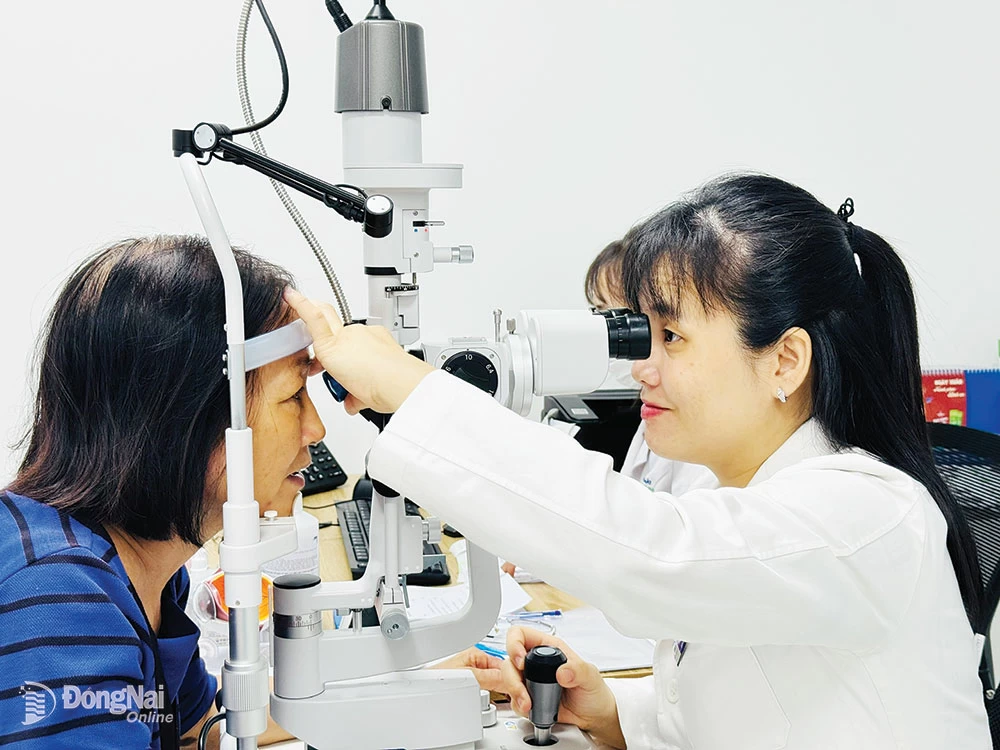 |
| Patients receiving medical examination at Hanoi - Dong Nai Eye Hospital. Photo: A. Yen |
According to Dr. Tran The Thang, Director of Operations at Hanoi- Dong Nai Eye Hospital, there are two main causes of ptosis (drooping eyelid). These are congenital (genetic abnormalities or levator muscle dystrophy from fetal stage. Children may have ptosis along with other refractive errors such as hyperopia or astigmatism), and other intraocular abnormalities. Acquired ptosis can result from trauma (traffic accidents, work accidents), systemic diseases (orbital tumors, brain tumors, autoimmune diseases such as lupus erythematosus, rheumatoid arthritis), or aging that weakens the levator muscle.
People with drooping eyelids often experience difficulties in daily life, studying, and working. In children, untreated congenital ptosis can lead to amblyopia – a condition of permanent vision loss. In adults, in addition to reduced vision, drooping eyelids also cause aesthetic concerns and low self-esteem in social interactions.
To treat ptosis (drooping eyelid), patients should visit medical facilities with experienced ophthalmologists for examination, assessment, and treatment prescription. Treatment at cosmetic clinics without specialized training can lead to many complications such as: damage to the levator muscle, infection, unsightly scarring, and even irreversible damage due to anatomical deformation.
Surgery is the most effective treatment for ptosis (drooping eyelid). Depending on the severity of the ptosis and the function of the levator muscle, the ophthalmologist will prescribe techniques such as: frontal muscle suspension (for cases where the levator muscle is weak or non-functional, often seen in congenital ptosis); levator muscle shortening (for mild to moderate ptosis where the muscle is still functional; this is a gentle intervention with a quick recovery time). In some special cases, autologous materials such as femoral tendons may be used, but this can easily leave scars, especially affecting aesthetics for female patients.
After surgery, patients should avoid strenuous activity around the eyes, avoid sun exposure to minimize hyperpigmentation, apply cold compresses, and attend follow-up appointments as scheduled. Any signs of inflammation, rejection of implant material, or other complications should be addressed promptly.
An Yen
Source: https://baodongnai.com.vn/dong-nai-cuoi-tuan/202506/dieu-tri-benh-sup-mi-2b300d4/





![[Image] The 14th Party Congress implements the content on personnel work.](/_next/image?url=https%3A%2F%2Fvphoto.vietnam.vn%2Fthumb%2F1200x675%2Fvietnam%2Fresource%2FIMAGE%2F2026%2F01%2F22%2F1769088146286_ndo_br_1-6165-jpg.webp&w=3840&q=75)

![[Photo] Voting for the 14th Central Committee of the Communist Party](/_next/image?url=https%3A%2F%2Fvphoto.vietnam.vn%2Fthumb%2F1200x675%2Fvietnam%2Fresource%2FIMAGE%2F2026%2F01%2F22%2F1769082445591_chi-9961-jpg.webp&w=3840&q=75)
























































































Comment (0)